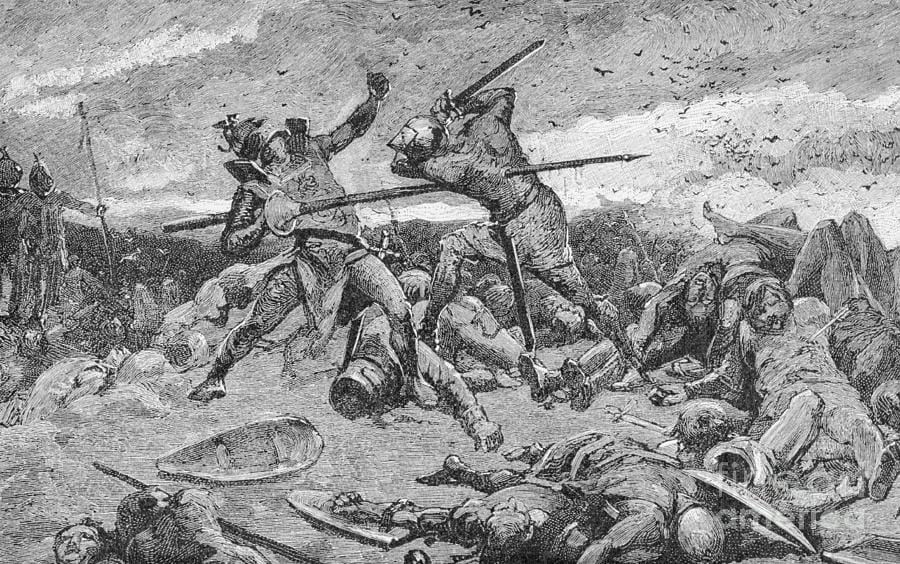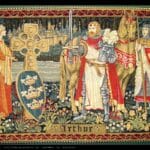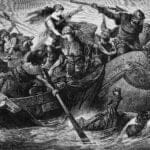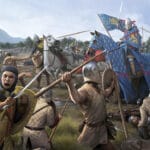Dive into the thrilling world of King Arthur and his epic battles against the Saxons! In this captivating read, we’ll uncover the truth behind the legendary figure who bravely defended Britain against invaders. From epic battles to his remarkable leadership skills, we’ll explore how King Arthur’s story has left an enduring legacy that inspires us even today. Join us as we journey back in time to the days of knights, castles, and the never-ending struggle between good and evil.
King Arthur and the Saxons: A Legendary Struggle
King Arthur. Even after all these centuries, his name still echoes with tales of bravery, magic, and fighting for what’s right. He’s a king cloaked in legends, a figure so deeply woven into the fabric of British history that it’s hard to tell where fact ends and fantasy begins. And at the heart of his story? A fierce, relentless struggle against the Saxons.
Imagine Britain in the 5th century AD. The once mighty Roman Empire, which had provided a semblance of order, had crumbled, leaving Britain vulnerable to invaders. The Saxons, a Germanic people seeking new lands, saw their opportunity and began their relentless incursions, heralding an era of conflict and change. This is where Arthur steps into the spotlight.
Was he a real king or a figment of legend? While historical evidence is scant, the stories tell of a valiant warrior who rose to unite the Britons against the Saxon invaders. Arthur, whether a historical figure or a product of legend, became a beacon of hope, a symbol of resistance against the odds.
The first written account we have of Arthur comes from Geoffrey of Monmouth and his 12th-century work, Historia regum Britanniae (The History of the Kings of Britain). While Monmouth’s account is filled with fantastical elements, it solidified Arthur’s place in our collective imagination. We see him, sword raised high, leading his loyal knights against Saxon invaders, his courage inspiring his people to fight on even when the odds were stacked against them.
One battle, in particular, stands out in Arthurian legend: The Battle of Badon Hill. This legendary clash, believed to have taken place around 500 AD, wasn’t just a battle, it was a turning point. While the exact location of Badon Hill remains a mystery, Arthur’s decisive victory against the Saxons stemmed the tide of their advance and ushered in a period of peace that lasted for decades. Arthur’s triumph wasn’t just a military victory, it was a symbol of hope rekindled, a testament to the strength of unity and resilience in the face of overwhelming odds.
Arthur’s story didn’t end with his final battle. It continues to echo through the ages, inspiring countless books, movies, and works of art. From the magical kingdom of Camelot to the legendary sword Excalibur, his tale is a tapestry woven from history, myth, and imagination.
Why does Arthur’s story still resonate so deeply with us? Perhaps it’s because, at its core, it’s a story about the fight for freedom, the courage to stand up for what you believe in, even when faced with overwhelming odds. King Arthur represents the best of humanity – our courage, our resilience, and our unwavering hope in the face of adversity. His struggle against the Saxons serves as a powerful reminder that even in the darkest of times, the human spirit, much like the legend of King Arthur, continues to endure.
Who Was King Arthur?
The name King Arthur is synonymous with bravery, chivalry, and the magic of Camelot. But did he actually exist? That’s a question that has puzzled historians and scholars for centuries. While definitive historical evidence remains elusive, the impact of his legend on literature, culture, and our collective imagination is undeniable.
The lack of concrete evidence hasn’t stopped people from searching for the “real” King Arthur. Some historians propose that Arthur might have been a Roman-affiliated military leader during the tumultuous 5th-6th centuries when Britain was facing the full brunt of the Saxon invasions. This period, marked by chaos and societal upheaval, would have been ripe for the emergence of a strong leader who could rally the fractured kingdoms of Britain against a common enemy. Could Arthur have been that leader?
Much of what we know about Arthur comes from medieval romances and the works of writers like Geoffrey of Monmouth. Monmouth’s “History of the Kings of Britain,” painted a picture of a powerful king, a conqueror who established a magnificent court at Camelot. And of course, no King Arthur tale is complete without his trusty magical sword, Excalibur, given to him by the Lady of the Lake. These tales, while entertaining, are more fiction than fact.
Despite the lack of definitive historical evidence, the legend of King Arthur continues to captivate us. He embodies the ideals of chivalry, courage, and leadership in the face of adversity. The enduring power of his story lies in its ability to speak to something universal within us—the desire for hope, for justice, and for a leader who will fight for what is right.
King Arthur and How He Fought the Saxons?
Legends abound about Arthur’s military prowess and his strategies against the Saxons. After uniting the people of Britain under his banner, Arthur faced the daunting task of halting the seemingly relentless Saxon advance. The Saxons, skilled warriors with a hunger for land, posed a significant threat to the fractured kingdoms of Britain.
Arthur’s victories were not solely due to brute force. He was said to be a brilliant tactician, utilizing strategy and cunning to overcome his enemies. One famous example is the legendary Battle of Bath, where Arthur, anticipating the Saxon’s movements, used the terrain to his advantage, ambushing and routing the invading forces.
Arthur understood that strength lay not just in military might, but also in unity. He formed alliances with other Celtic kings, recognizing that a united front was the key to resisting the Saxon invaders. Through diplomacy and a shared purpose, he forged a powerful coalition that challenged Saxon dominance.
Perhaps Arthur’s greatest victory came at the Battle of Mount Badon. This decisive victory, mentioned in several historical sources, is credited with halting the Saxon advance for a generation and helped to establish a period of relative peace and stability.
The stories of Arthur’s battles, whether rooted in historical fact or embellished through legend, paint a picture of a leader willing to defend his people against overwhelming odds. It is this indomitable spirit, the courage to face down seemingly insurmountable challenges, that makes Arthur’s story so enduring and continues to inspire us to this day.
What Were the Key Battles Between King Arthur and the Saxons?
The legendary battles fought between King Arthur and the Saxons are the stuff of legend. Dive into the realm of ancient legends and explore the king arthur timeline to uncover the captivating history and mythical adventures of King Arthur and his knights.
One of the most pivotal battles was fought at the Battle of Bath. Here, Arthur’s forces cleverly outmaneuvered the Saxons, securing a decisive victory that showcased Arthur’s strategic brilliance. The Battle of Badon Hill, perhaps his most famous victory, marked a turning point in the conflict with the Saxons. The victory is said to have brought about a period of peace that lasted for decades.
Arthur’s campaigns against the Saxons encompassed a series of twelve significant battles, each victory further solidifying his reputation as a skilled warrior and a gifted military leader. These battles, fought across the length and breadth of Britain, highlight Arthur’s commitment to defending his homeland. To understand the complex relationship between these two cultures, delve into the fascinating connection between king arthur and the romans and discover the intriguing interplay between these two great civilizations.
While many of the details of these battles have been lost to time or embellished through legend, they represent a crucial part of British history, a time when the island nation faced a persistent threat from invaders. The battles serve as a powerful reminder of the struggle for freedom and the enduring legacy of a legendary king who fought to protect his people.















